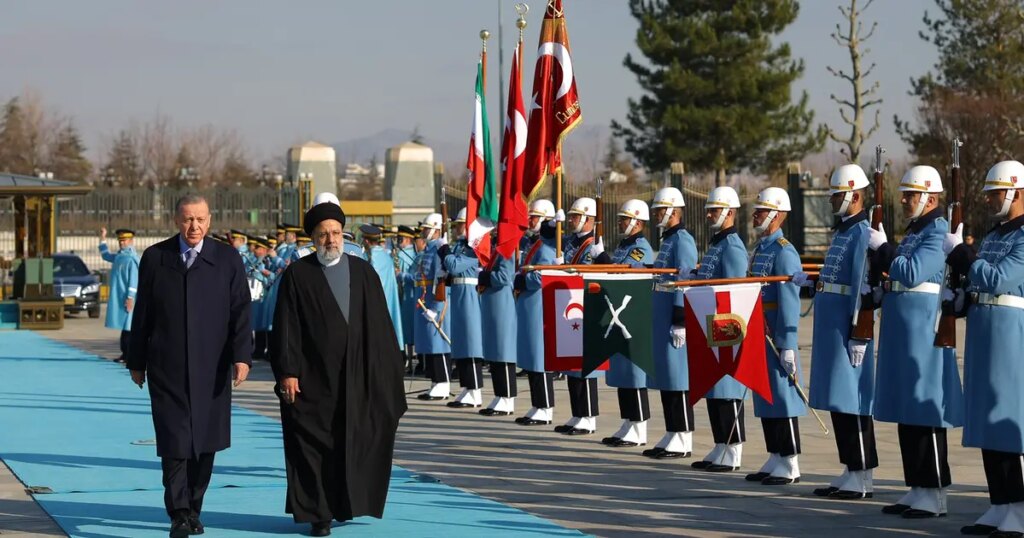Iranian President Ebrahim Raisi’s visit to Turkey this week comes against the backdrop of the Gaza war, ongoing regional crises, and tensions in bilateral relations.
Wednesday’s visit and the issues discussed reflected the complex power relationship between Iran and Turkey. The visit resulted in 10 agreements emphasizing cooperation in energy, free trade and transport. This highlights the importance of political cooperation and conflict resolution in Iran-Turkey relations, and the delicate balance between cooperation and addressing regional complexities amidst geopolitical challenges.
Raisi’s visit underscored ongoing efforts to strengthen economic ties while building an image of agreement on regional issues. While mutual distrust may remain, the visit and developments in relations demonstrate ongoing efforts to move beyond complex relations by focusing on potential areas of convergence in economic cooperation and regional policies.
assignment
Geopolitical competition, conflicting regional goals, and security concerns are causing friction between Iran and Turkey. Despite joint efforts to combat terrorism and drug trafficking and strengthen regional security, political and ideological differences persist and are exacerbated by the evolving political situation in the Middle East. Historically, both countries have sought to take advantage of shifts in the regional balance, particularly with escalating conflicts in Syria and Iraq. Cooperative efforts against the PKK and PJAK, and common economic and security interests, are overshadowed by significant differences.
While the Islamic Republic is focusing on the economic aspects of the relationship to boost domestic morale, the significance of Raisi’s visit to Ankara is to discuss regional security and stability, as well as shared concerns over terrorist groups and Kurdish forces. During their meeting, Raisi and Erdogan are likely to have addressed Ankara’s concerns over Kurdish groups, which are considered “terrorist” in Turkey, Iran, Iraq and Syria. The bilateral talks also touched on the impasse in the Gaza Strip, where Israel continues to operate against Hamas, an Iranian vassal and friend of Turkey.
Israeli soldiers operate in the Gaza Strip as the conflict continues between Israel and the Palestinian Islamist group Hamas (January 25, 2024)
gaza war
The Israeli factor adds complexity to Turkish-Iranian relations, which are characterized by historical ties that include trade, tourism, and some intelligence and military cooperation. Geopolitical changes, particularly Turkey’s stance on Syria to the detriment of Iranian ally Bashar al-Assad, have strained relations.
The recent conflict in Gaza has affected the power relationship between Iran and Turkey, resulting in a mix of cooperation and tension. The complexity of this relationship is influenced by geopolitical, economic, and security factors, and includes a mix of cooperation and conflict. Khamenei’s call for Israel to “cut off vital lifelines” stands in contrast to Turkey’s ongoing economic relations and highlights the delicate power dynamics. Turkey’s pursuit of economic ties with Israel could diverge from Iran’s objectives, as Iran uses the Gaza war to increase its influence in the region through proxies amid tensions.
economic cooperation
Different circumstances have shaped Iran-Turkey economic relations. The two countries have continued their business ties, especially in the oil industry, despite Iran’s economic difficulties and sanctions. The two countries have explored solutions such as “commodity gas” and Iranian natural gas exports. President Ebrahim Raisi’s declared goal of increasing bilateral commerce to $30 billion per year indicates ambitious economic aspirations.
However, trade between Iran and Turkey amounted to a paltry $4.4 billion in the first 10 months of 2023, down 16% year-on-year. Mehdi Safari, Undersecretary of Economic Diplomacy at the Ministry of Foreign Affairs, said the president’s visit to Turkey will focus on strengthening energy cooperation, including extending gas contracts. Investment in Iran’s gas resources and cooperative efforts in establishing electricity connections from Khoi to Van were certainly discussed, but the extent to which Raisi’s wish list will be realized is somewhat questionable. The current natural gas agreement between Iran and Turkey is scheduled to expire in 2026. This highlights the difficulties and unknowns involved in maintaining economic partnership between the two countries.
Iran-Turkey relations are expected to include both cooperation and conflict and be characterized by mutual distrust along with a sustained level of cooperation. While major changes in the relationship may not be on the horizon, cooperation is expected to continue in countering terrorism, fighting drug trafficking, and promoting regional stability. The two countries have a track record of finding common ground and navigating complex relations amid occasional conflicts. The delicate balance between cooperation and conflict will be influenced by geopolitical realities and each country’s objectives in Iran-Turkey relations.
President Raisi’s visit to Turkey may not immediately resolve the ongoing issues between the two countries. A comprehensive approach is needed to go beyond official statements and consider conflict and cooperation, especially in areas such as the Syrian crisis and the Kurdish issue. It is worth noting that the situation is further complicated by the possibility that Iran may not be able to supply more natural gas to Turkey due to the natural gas shortage.


